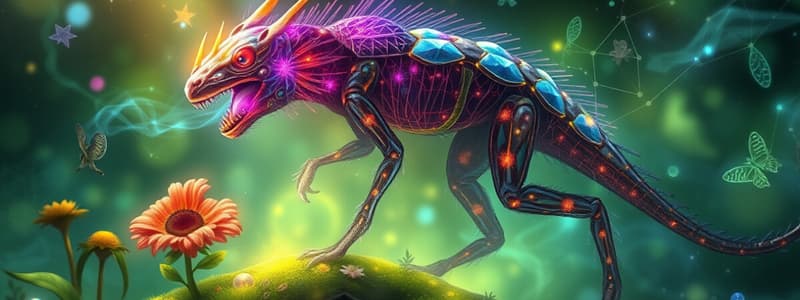Podcast
Questions and Answers
The classification levels are _____
The classification levels are _____
Kingdom-Phylum-Class-Order-Family-Genus-Species
_____ is the person who developed one of the first known classification systems.
_____ is the person who developed one of the first known classification systems.
Aristotle
_____ is the science of classifying living things.
_____ is the science of classifying living things.
taxonomy
Organisms are classified into _____ kingdoms.
Organisms are classified into _____ kingdoms.
Viruses are made up of a piece of nucleic acid covered by _____
Viruses are made up of a piece of nucleic acid covered by _____
_____ is the Swedish botanist who is known as the father of modern taxonomy.
_____ is the Swedish botanist who is known as the father of modern taxonomy.
The classification level made up of related classes is called a _____
The classification level made up of related classes is called a _____
Out of Monera, Plantae, Protista, Virus, Animalia, and Fungi, which one is not a kingdom?
Out of Monera, Plantae, Protista, Virus, Animalia, and Fungi, which one is not a kingdom?
The classification level made up of related classes is called a _____
The classification level made up of related classes is called a _____
_____ is grouping things according to their similarities.
_____ is grouping things according to their similarities.
_____ contain only one kind of organism.
_____ contain only one kind of organism.
_____ are plant-like organisms that lack chlorophyll.
_____ are plant-like organisms that lack chlorophyll.
Unicellular organisms that have a nucleus are _____
Unicellular organisms that have a nucleus are _____
A bacteriophage is a virus that infects _____
A bacteriophage is a virus that infects _____
Viruses can only reproduce _____
Viruses can only reproduce _____
_____ is the classification group made up of related phyla.
_____ is the classification group made up of related phyla.
Genetic material is coiled and located in one region in _____
Genetic material is coiled and located in one region in _____
_____ is a single-celled organism without a nucleus.
_____ is a single-celled organism without a nucleus.
_____ is a plant-like organism that lacks chlorophyll.
_____ is a plant-like organism that lacks chlorophyll.
_____ is a microscopic organism that has a nucleus.
_____ is a microscopic organism that has a nucleus.
_____ is a many-celled organism that cannot make its own food.
_____ is a many-celled organism that cannot make its own food.
_____ is a many-celled organism that can make its own food.
_____ is a many-celled organism that can make its own food.
Moneran contain _____ genetic material.
Moneran contain _____ genetic material.
_____ have a nucleus.
_____ have a nucleus.
_____ is grouping things according to their similarities.
_____ is grouping things according to their similarities.
_____ is the science of classifying living things.
_____ is the science of classifying living things.
The classification group made up of related phyla is _____
The classification group made up of related phyla is _____
The classification group made up of related classes is _____
The classification group made up of related classes is _____
The classification group made up of related species is _____
The classification group made up of related species is _____
Group of organisms that look alike and can reproduce among themselves is _____
Group of organisms that look alike and can reproduce among themselves is _____
_____ is a plant-like organism that has cells with nuclei.
_____ is a plant-like organism that has cells with nuclei.
A single-celled organism that does not have a true nucleus is a _____
A single-celled organism that does not have a true nucleus is a _____
A simple organism that has a true nucleus is a _____
A simple organism that has a true nucleus is a _____
A nonliving particle made up of a piece of nucleic acid covered with protein is a _____
A nonliving particle made up of a piece of nucleic acid covered with protein is a _____
The protein covering of a virus is the _____
The protein covering of a virus is the _____
_____ is a virus that infects bacteria.
_____ is a virus that infects bacteria.
Flashcards are hidden until you start studying
Study Notes
Classification Levels
- Classification follows a hierarchy: Kingdom, Phylum, Class, Order, Family, Genus, Species.
- Organisms are categorized based on shared characteristics at each level.
Historical Contributors
- Aristotle created one of the first known classification systems.
- Carolus Linnaeus, a Swedish botanist, is known as the father of modern taxonomy.
Taxonomy and Classification
- Taxonomy is the science focused on classifying living organisms.
- Classification involves grouping organisms by similarities and differences.
Kingdoms of Life
- Organisms are classified into five kingdoms: Monera, Plantae, Fungi, Animalia, and Protista.
- Viruses are not classified within the kingdoms as they are considered nonliving.
Viruses
- Viruses consist of a nucleic acid core covered by a protein coat known as a capsid.
- Bacteriophages are viruses specifically that infect bacterial cells.
- Viruses can only reproduce inside living cells.
Organism Characteristics
- Fungi: Plantlike organisms that lack chlorophyll and have cells with nuclei.
- Protista: Microscopic, often unicellular organisms that contain a nucleus.
- Moneran: Single-celled organisms without a true nucleus, characterized by coiled genetic material in one region.
- Animalia: Multicellular organisms that cannot produce their own food.
- Plantae: Multicellular organisms capable of photosynthesis and producing their own food.
Classification Details
- Species: The basic unit of classification, consisting of organisms that resemble each other and can reproduce.
- Genus: A classification level comprising related species.
- Phylum: A level made up of related classes.
- Kingdom: The broadest classification group composed of related phyla.
Organism Structures
- Bacterial cells are targeted by specific viruses, such as bacteriophages.
- Organisms in the Protista kingdom include those with true nuclei, while Moneran organisms lack this structure.
Study Reminder
- Remember that classification assists in understanding relationships among organisms and serves as a basis for biological sciences.
Studying That Suits You
Use AI to generate personalized quizzes and flashcards to suit your learning preferences.




